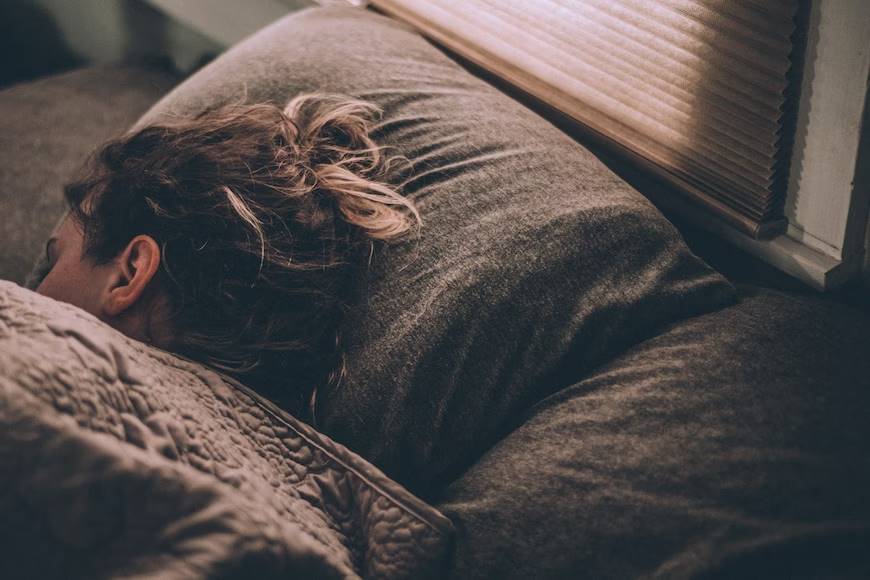Finding a way to get a better night’s sleep is a challenging endeavor.

As a result of being able to stay up until three o’clock in the morning, it’s easy to feel that having a decent night’s sleep is an impossible aim to achieve while you’re wide awake. Despite this, the fact is that you have a considerably bigger influence on the quality of your sleep than you are now aware of. Additionally, how well you sleep at night has a huge influence on how you feel throughout the rest of your waking hours. Typically, when it comes to sleep issues, the solution may be found in the activities that you engage in daily.
Keep in mind that you should avoid getting up too early in the morning, even on the weekends, to avoid a hangover. As a rule of thumb, the more severe your jetlag-like symptoms are, the greater the gap between your sleep patterns on weekends and weekdays will be in most cases. To make up for lost sleep after a late night, it is advisable to take a few naps throughout the day rather than sleep in later in the morning to make up for a lost time. The application of the above-mentioned strategy may enable you to remove your sleep debt while preserving your usual sleep and waking patterns (which is important).
How To Get Sleep At Night Naturally
Creating a napping schedule will help you stay on track when the time comes. For those who have difficulty getting asleep or remaining asleep at night, napping throughout the day may not be a practical choice for them. Even while napping is an excellent method of making up for missed sleep, it has been shown to aggravate the disease in some people. For whatever reason, it is best to avoid sleeping for more than 15 to 20 minutes at a time in the early afternoon.

Breakfast should be nutrient-dense to provide a solid foundation for the remainder of the day and into the evening. The consumption of a well-balanced breakfast may be beneficial in synchronizing your biological clock by sending signals to your body that it is time to wake up and begin moving in the morning. If you skip breakfast, your blood sugar cycles become unpredictable, which in turn decreases your energy levels and raises your stress levels, all of which can lead to sleep troubles as a result.
An average day includes the following types of activities, which take place during the day:
Take advantage of the bright sunlight first thing in the morning to help you wake up more quickly! Having the ability to get out of bed in the mornings and do something constructive will have a huge positive impact on your overall well-being. Whether you like to drink your coffee outside or have your breakfast in front of a bright window, you may do both at the same time if you wish. If you have a bright light shining on your face after a lengthy period of sleep, you will have a better chance of regaining your consciousness.
Increase your physical activity by extending your outside activities throughout a typical day. Increase your productivity by making use of natural light during your work breaks, taking a stroll outside, and walking your dog during the day rather than at night.
Getting A Good Night’s Sleep Naturally
A sensible option is to take advantage of natural light in your house or at your place of business. During the day, please make every effort to keep the curtains and shades open, and attempt to position your desk as near to the window as possible as compared to the other areas of the room.
When a physician determines that light therapy boxes are essential, they can be used to treat patients. The use of artificial light to simulate natural sunshine may be especially beneficial during the short winter days, but this is not guaranteed to be effective.
Another piece of advice is to take part in some form of physical activity at least once per hour.

Exercise is associated with a more peaceful night’s sleep as well as reduced tiredness throughout the day for those who participate. As shown by research, participating in regular physical activity can help to alleviate the symptoms of insomnia and sleep apnea while also improving the amount of time you spend in deep, restorative sleep.
If you engage in high-intensity physical exercise, the sleep benefits you acquire will be more effective as a consequence of the increased efficacy of your workout. Physical exercise of even a modest amount, such as walking for 10 minutes a day, has been shown in some studies to help people sleep better by improving the quality of their sleep.
To get the full health benefits of regular exercise while sleeping, you may need to put in several months of dedicated effort consistently over several months to reap the benefits. To summarise, take your time and concentrate on creating a long-lasting exercise habit that you will like and be able to maintain over an extended period.
Although it is unlikely, it is possible that physical activity performed at the appropriate time of day can enhance the overall quality of your sleep by increasing your sleep efficiency.
How To Get Sleep At Night Fast Naturally
In addition to the various health advantages associated with physical exercise, they include an increased metabolic rate, an increase in body temperature, and stimulation of the synthesis of hormones such as cortisol, just to mention a few. Physical activity should, however, be avoided too close to bedtime since it has been demonstrated to harm both the quality and quantity of sleep. Regardless of the time of day, whether it is in the morning or the afternoon, exercise is recommended.
Exercises ranging from moderate to severe in difficulty should be undertaken at least three hours before you want to retire for the night to enjoy the maximum benefits. If you’re still having trouble falling asleep, you might want to consider starting your workouts even earlier in the morning to allow yourself more time to wind down before bed. It has been shown those evening activities that are both peaceful and low-impact, such as yoga or gentle stretching, can be excellent for sleep promotion.
It is possible that a body scan workout can help you get a better night’s sleep at night by lowering your stress levels.
The practice of concentrating your attention on different regions of your body has the potential to help you become more mindful of and release any stress or tension that you may be carrying around with you. It is known as “focusing your attention” when used in this manner.
Starting with your feet up on a sturdy surface, maintaining your knees uncrossed, and your arms relaxed at your sides with your eyes closed is a great way to get started in this position. Keeping your attention only on your breathing for around two minutes, or until you begin to feel more relaxed, is the purpose of this technique.
As soon as you have completed this, your attention should be drawn back to the toes of your right foot. Keeping an eye out for any stiffness while maintaining your concentration on your breathing cannot be overstated. Keep in mind that with each deep inhale, you travel down to your feet and back up to your head. By concentrating hard, you will attempt to retain your attention on this spot for at least three to five seconds at a time.
The arch and sole of your right foot should be the major focus of your attention during this exercise. Keep track of whatever emotions you are having in that portion of your body and assume that each breath is coming from the soles of one or both of your feet, depending on how long you have been doing this technique. As soon as you’ve finished massaging your left ankle, switch your attention to your right ankle and repeat the process. Begin with your left calf and work your way up to your knee, thigh, and hip before switching to your right leg and repeating the exercise on the opposite side. Complete the process with both legs if at all possible. As you begin at the bottom of your body and work your way up, start with your lower back and belly, then move on to your upper back and chest, and then finish up with your shoulders, as seen below. Put forth an attempt to direct your attention to any part of your body that feels particularly tense at this moment.

Once you have done the body scanning exercise, you should become aware of how your body is feeling in general after having done it. Your body and mind should be in a state of relaxation that allows you to effortlessly drift off to sleep to fall asleep quickly.
A nightly sleep meditation that integrates techniques such as deep breathing, awareness, and body scans to aid you in relaxing and emptying your thoughts may be accessed through the link provided below.
Ways To Get A Good Night’s Sleep
It has already been said that the sixth option is to increase the comfort of your sleeping environment when you are sleeping.
Make getting enough sleep your first and most important priority each day.
Using a relaxation method such as visualization, progressive muscle relaxation, or meditation may be essential if you are having difficulty falling back asleep. You may be able to perform most of these strategies without ever having to leave your house. While relaxing may not be a substitute for sleep, it may be useful in terms of recharging your physical and mental energies while also restoring your feeling of balance.
Stress and anxiety can be lessened by indulging in a calm, non-stimulating hobby like reading or watching television. Remove yourself from your bed as soon as you realize you’ve been awake for more than 15 minutes to reduce tension by doing something restful and unstimulating. Reading a book or watching television, for example, are both appropriate recreational activities. Keep the lights dull and electronic devices such as screens out of the room if you want to prevent your body from getting the signal that it is time to wake up in the morning.
By delaying your complaining and brainstorming until later in the day, you can save yourself from being overwhelmed. To cope with difficulties that arise in the middle of the night, it’s better to write them down and put them off until the next day, when resolving the problem will be less difficult the following day. Consider making a mental note of any brilliant thoughts that have been keeping you up, and then going back to sleep with the confidence that you will be much more productive the following day after getting a decent night’s sleep. This will allow you to be more productive the next day as a result of this.
As a general rule, make well-informed decisions about your food and beverage selections.
During the day, your eating habits are the most crucial thing to consider when it comes to falling asleep at night. This is particularly true in the hours leading up to bedtime.
Include heart-healthy foods in your diet as much as possible. Individual meals have the potential to have the greatest impact on your overall health, but it is your general eating patterns that have the most influence on the quality of your sleep and the state of your overall health over time. If you consume a Mediterranean-style diet that is high in vegetables, fruit, and healthy fats, it is conceivable that you may fall asleep more quickly and remain asleep for longer periods (with moderate quantities of red meat).
It is recommended that you limit your intake of sugary foods and processed carbohydrates. If you consume a large amount of sugar and refined carbohydrates throughout the day, you may experience difficulty sleeping at night. Consequently, you may be unable to enter into the deep, restorative sleep that you want to recuperate from the events of the previous day.
Avoiding the consumption of caffeinated beverages and nicotine to the greatest extent possible should be a top priority. Caffeine has been shown to cause sleep problems for up to ten or twelve hours after ingestion, which may surprise you if you’re like the majority of the population. Apart from the fact that tobacco products are stimulants, the use of tobacco products may cause sleep disturbances as a result of the stimulant impact. This is especially critical if you smoke in the evenings or right before bed.
Getting To Sleep Naturally
Before retiring for the night, have a look at your sleeping and waking cycles to make sure they are in sync with your body’s natural rhythms.
Maintaining a healthy balance between your sleeping and waking cycles that is consistent with your body’s natural sleep-wake cycle, also known as your circadian rhythm, is one of the most effective strategies for improving both the quality and quantity of sleep you receive. The long-term benefits of maintaining a regular sleep-wake cycle rather than sleeping the same number of hours at various points throughout the night can leave you feeling substantially more refreshed and revitalized, even if your sleep pattern is only altered by an hour or two each night.
Avoid being late for work by making a conscious effort to go to sleep and wake up on a consistent schedule every morning. As a bonus, it helps to maintain the synchronization of your body’s internal clock while also improving the overall quality of your sleep. Choose a bedtime that corresponds to when you are most likely to fall asleep to reduce tossing and turning in your sleep during the night. With adequate sleep, you should be able to wake up without the assistance of an alarm clock in the morning without any difficulty. If you use a timer, you may or may not find yourself waking up later in the morning than you would have otherwise.
Contents